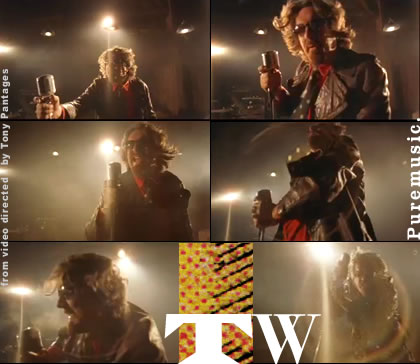
A Conversation with Tom Wilson (continued)
PM: I thought it was a cool idea of Colin Linden's to cut this record in Nashville.
TW: Yeah, I think so, too. I think part of the idea was that he wanted me to get out from where people might be too familiar with me. As great as some of the people that I play with are, they know me too well, and have seen me go through quite a few transitions over the last little while.
PM: They've been on the whole roller coaster, yeah.
TW: Yeah, a bit of a roller coaster. And we needed a clean slate. Also, Colin Linden believes that I'm a great musician, and out of all the people that I've ever played with, he's really the only person that has said, "You're a fantastic musician."
PM: That's amazing.
TW: Yeah. Especially from him, because he's probably about the best musician that I've ever played with.
PM: Scary good.
TW: So that's a really great compliment. He wanted me to play with people that he thought I merited playing with, really. He wanted to put together a band that I could lead that he felt wouldn't be necessarily a challenge, as just more of an--
PM: An inspiration.
TW: An inspiration, yeah, that's absolutely right, an inspiration.
PM: Some of my favorite bass players--Bob Babbitt is a trip, right?
TW: Well, they're all fantastic.
PM: Yeah, but I love Gary Tallent and Dave Roe, too.
TW: Gary Tallent and Dave Row. And Colin Linden played bass on one song, too. But I'd say that when writing the type of music Dog Years is, which is kind of like what I did in rock 'n' roll, with Junkhouse--it's all about bass. I've never been a guitar wanker. I've never been a guy that wrote rock 'n' roll based around--
PM: Guitar licks.
TW: Yeah. Or flashy guitars. It's always been about the bottom end, and it's always been about the bass.
PM: Yeah. And I mean, your voice, too, is all about the bottom end.
TW: Oh, yeah, yeah.
PM: I was interested that he pulled in [drummer] Tom Hambridge on that record, who did a great job.
TW: Yeah. Well, there was one point where we had two drummers playing.
PM: Brian Owings, too.
TW: Yeah, the two of them together, which was pretty exciting.
PM: Yeah, I love both of those drummers.
TW: The bottom end--you know, bass and rhythm are really the most important things, to me, in rock 'n' roll. And that's kind of where we went with that.
PM: Yeah. Hambridge is a very good songwriter, too, and a good front man.
TW: I didn't know that.
PM: Yeah, he's really good. He's done a lot of work with Lynyrd Skynyrd and George Thoroughgood, and all kinds of stuff. He's a very interesting character.
TW: The main thing I know about the guy, he's a riot to hang out with.
PM: Yeah, he's a great dude.
TW: He's a great guy. And I find that the older I get I just want to work with people who are happy to be working, and like to hang out, and that I get along with. The struggles--I don't feel like struggling over my music. We struggle over everything else in our lives. I don't feel like struggling about the music.
PM: Right. But most important, it feels like the essence of who you are and the essence of what you do is really coming through on the record, and that's what's beautiful.
TW: Yeah.
PM: And that's Colin, in great part.
TW: Yeah, for sure.
PM: But even more than Colin, it's really about you, because the only way that that's going to ever happen is if a person can reach that essence, first of all, and whether or not they're able to share it.
TW: Yeah.
PM: And that's you.
TW:Well, Colin's job is kind of that also. Working with Colin is like working with somebody who is not only your friend, but also somebody who's kind of a fan. You really can't buy attention like that. And the other thing about Colin is that when you're about to enter the cheese factor--
PM: [laughs]
TW: --if you're trying to put the cheese whiz back in showbiz, Colin will stop you from doing that. [laughs] Colin is the guy that puts the song first, and puts music first, and the intention of creating music is a righteous one to him. So as a result, the songs kind of don't necessarily speak in any modern music or hit format language. They speak in a language of their own, and they're kind of individual beautiful ideas. And when you put on the record at the end, that's what you get.
PM: Yeah. continue
print (pdf) listen to clips puremusic home